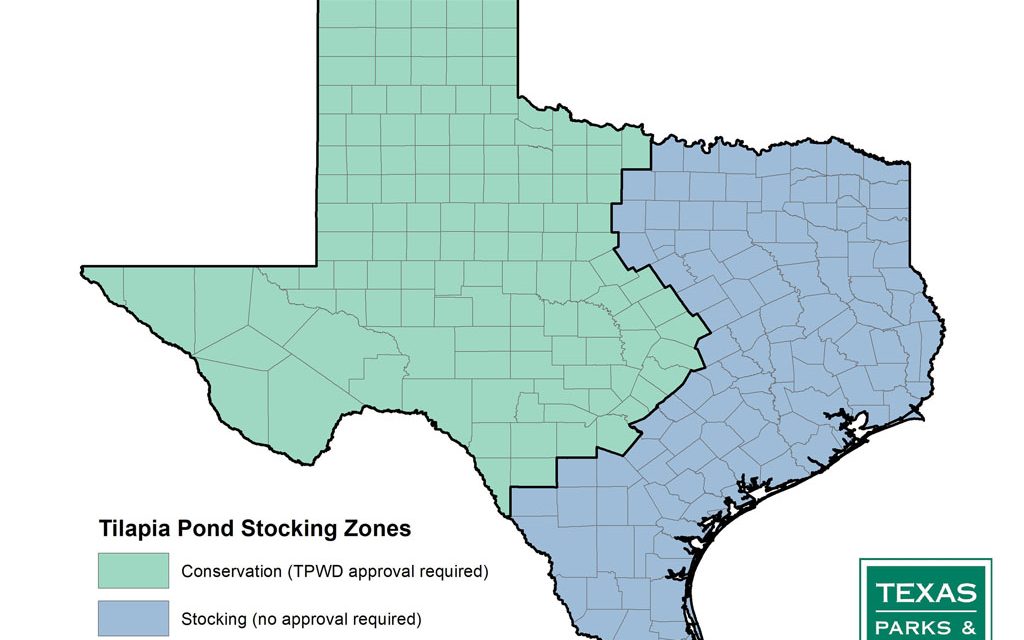The Texas Parks and Wildlife Commission approved changes to regulations regarding harmful or potentially harmful fish, shellfish and aquatic plants along with associated fee rules on Tuesday November 10. The changes not only impact permit holders, but there are several key changes relevant to the general public. These new regulations go into effect January 11, 2021.
One of the regulations approved by the commission directly affects anglers who may catch exotic fishes such as tilapia and grass carp. Under this new regulatory exception, anglers will no longer be required to behead or gut the fish upon possession as the only allowable kill methods. The fish must still be killed upon possession, but gill-cutting, placing the fish on ice, or killing them by any other means will also now be allowed.
The commission approved another significant regulatory exception for landowners. Landowners who wish to remove small quantities of prohibited exotic aquatic plants from along lake or riverfront shorelines, docks, or private ponds for the purposes of disposal will no longer be required to obtain an exotic species permit. The plants must be fully dried or placed in black garbage bags prior to disposal. However, any person removing prohibited exotic aquatic plants for hire will still require an exotic species permit. Anyone wishing to remove these plants must still submit a nuisance aquatic vegetation treatment proposal to the department for approval even though a permit is no longer required for private landowners. This is necessary in order to ensure aquatic vegetation is managed in a way that protects aquatic habitats. Visit the TPWD website for more information on treatment proposals and nuisance aquatic vegetation.
The regulation change also applies to landowners who need to remove small quantities of prohibited zebra mussels or applesnails from their shorelines or associated infrastructure such as docks or private water intakes for the purposes of disposal. Provided they are securely contained in black plastic bags prior to disposal, they can be removed without a permit under the new regulation.
Aquaponics hobbyists or other non-commercial aquaculturists wanting to keep tilapia in recirculating aquaculture systems that do not discharge water will be allowed to purchase and possess blue, Nile, Mozambique, and Wami tilapia without a permit under new guidelines approved by the commission. The fish cannot be sold and must be purchased from a permitted Texas seller accompanied by an exotic species transport invoice. The invoice is required to be retained for one year or as long as the fish are in possession. In addition, the aquaculture system must be secured in a way to prevent unauthorized removal of the tilapia.
Pond owners in a newly designated “conservation zone” (see map) where the department has determined that tilapia escapes could cause harm to imperiled native fishes will now need to obtain TPWD approval before stocking tilapia in their ponds. Pond owners won’t be charged a fee for the approval, which can be requested from TPWD by either the pond owner or their agent, including the tilapia seller. The approval will not expire unless the pond is modified in a way that would increase the risk of escapes and can be transferred to a new owner when a property is sold.
In the designated “stocking zone” (see map), department approval will not be required to stock tilapia, although escape of the fish into public waters remains unlawful. Additionally, in this zone, the department will administratively “fast track” applications for 10 or fewer triploid grass carp for pond stocking.
Under the new regulations, crested and yellow floating hearts will be prohibited and can no longer be purchased or possessed. Crested and yellow floating hearts are exotic aquatic plants that are sometimes used in ornamental water gardens. Even though these species have not been found in the ornamental plant trade in Texas in recent years, they have been introduced in several Texas lakes. These species have become problematic, requiring treatment to maintain boater access. As with all prohibited plants such as hydrilla, Eurasian watermilfoil, and giant salvinia, they must be removed from watercraft before leaving a lake.





